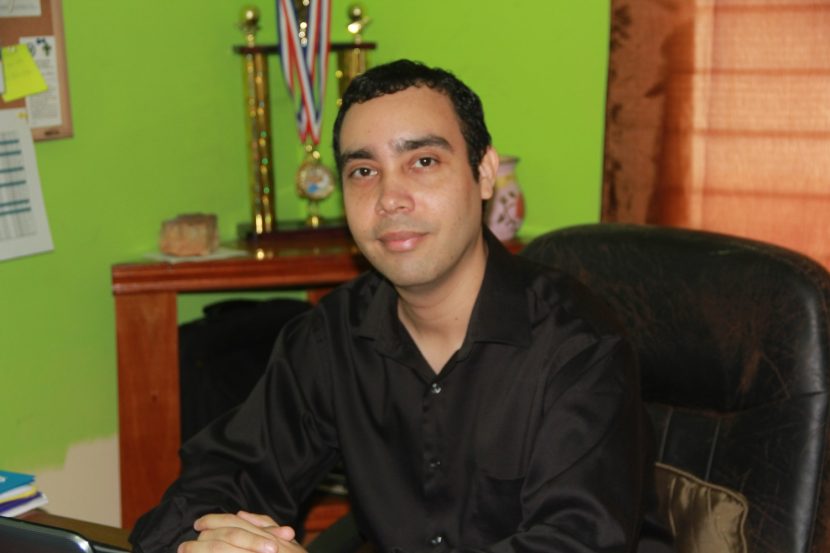
If this is your first semester with us, and I know it is for a few of you, then you have quite a lot to look forward to. If it’s not, I hope you spent the few days between classes getting some rest, and are now ready to wear that scholar’s cap once again.
For those of you who don’t know me (yet), I primarily teach the Computer Science courses here at Galen, and our program focuses on programming, on the development of software. This means that, while computers largely control the world these days, we in turn learn how to control them. That’s a lot of responsibility for young minds and so, along with the technical skills that go along with their degree, I am also quite interested in ensuring that my students are exposed to the more “human” side of the professional world.
This involves a number of diverse aspects, including communication, diplomacy, and ethics. As I often say to my classes, every course you take in a university such as this one is a communication course. If you develop the best program/software/whatever, but can’t explain to people why they should be interested, then they won’t be. Your genius will be lost.
Similarly, we need only turn on the news to bear witness to the large and increasing number of highly trained, and very talented, individuals whose careers and lives have come crashing down due to their inappropriate behavior.
In order to be successful, one needs to have not only competence in a chosen profession, but also a worthy character. A good university, such as the one you are currently attending, is heavily invested in the development of its students’ characters. This is what we really mean when we speak about “well rounded” graduates.
Yes, that involves being competent, even excellent, at the work you do according to some job description on a contract document. But it also means being effective communicators, being innovative in finding solutions to problems, and adopting an ethical approach to what you will accept or reject. It’s about making yourself into who you want to be.
As the saying goes “bad news travels fast;” in a similar vein, whether it’s fiction, history, or politics, it is often easier to find a bad example than a good one. How do we avoid becoming bad examples ourselves? How do we avoid the pitfalls that life throws at us, regardless of our educational background and any other advantages we may hold?
To a large degree, it begins with the level of discipline required to be a good student. If that sounds too simple, then think about it this way: the same mindset that results in an effective student experience also results in a valuable, trustworthy worker, and extends into all aspects of life beyond the halls of learning.
Time management, critical thinking, and practical competencies are common virtues to all of these, and for many people, their university years constitute the first period of time when they really become critical. In addition to this there is also a more subtle lesson that, unfortunately, many students don’t seem to internalize until it is too late to do them as much good as it might. And what is this grand secret? What is this extra “edge” that our students can leverage to improve their grades, and give them an even greater head start as powerful, ethical professionals?
I’ll tell you next month.
Ok, fine… here it is. There’s a psychological shift that students are (or should be) invited to make by their teachers, and it is this: don’t just see the material in your classes as a bunch of facts to memorize. Instead, see it as a set of information that is designed to impact you in a more fundamental way than merely academically. See it as an opportunity to adjust your mind and even, to a degree, your personality.
I’ve seen this in my own classes, to be perfectly honest with you. As I said a few paragraphs ago, I “primarily” teach the Computer Science courses at Galen. I also occasionally teach mathematics courses, and – at least once a year – the Ethics class. In my most technical courses, it is often more difficult to get students emotionally (and therefore effectively) invested than in the discussions that often take place in Ethics. To a degree, this is to be expected; the Ethics course deals with topics that we may encounter on a daily basis, and can lead to some very opinionated and engaging discussions, whereas the inner workings of a CPU or an operating system is not really open to interpretation, and is furthermore of interest only to a very small subset of the human race.
This is not to say that there is no interest whatsoever. Those who can actually see themselves using knowledge of computer hardware and software for a job or a hobby do pay attention, remember the relevant concepts, combine what they are learning with previous knowledge to come up with new ideas, and perform very well on activities designed to evaluate their understanding of the material. Most of them even find it enjoyable, and I can’t take ALL the credit for that. And this is largely the point – those who are able to see the value of what they are learning, not just the details of what they are learning, tend to do better, both as students and as graduates.
With this in mind, there is a degree of responsibility on both sides of the equation in order to take advantage of the impact of students’ affinity for course content. Teachers need to diligently guard against delivering classes that may accurately be described as a recitation of dry facts. Even the most theoretical and technical of classes can be presented in such a way that students are exposed to the real-life implications of the content they are being asked to absorb. Those teachers that are passionate about their fields will find this easy enough… and I quickly learned in my courses not to “apologize” for the amount of math or science content I was delivering. It might seem useful, at first, for teachers to give the impression that they are on the students “side” in their apparently genetic disposition to dislike these subjects, but all we really do long-term is reinforce their aversion, and therefore reduce the likelihood that they will actually care about the scientific underpinnings of whatever it is we are actually teaching.
The truth is that we’re actually genetically disposed to like math from a very young age. When we get a cookie as a very young child, we immediately want to add to our total of acquired cookie wealth. We want to divide our attention among the various colorful objects we are given to play with, we want to multiply the amount of attention we get from our parents, and we definitely want to subtract from whatever it is that ends up in our diapers. Babies like math… they just can’t tell you, and by the time they learn to talk, a lot of them have probably learned to toe the party line. If their teachers, responsible for moulding them as they grow up, make it seem like they shouldn’t like math and science, then who are they to argue?
As I said, though, the teachers’ responsibility here is only half the story. Like so many other things in life, success here depends as much on un-learning things as learning things. Regardless of what we’ve had to deal with in the past, a significant portion of “liking” or “disliking” something comes down to choice. A few articles ago, I mentioned a friend of mine who used to ask people, almost as a catch phrase, “What’s the point?” Here is another opportunity for me to encourage you to adopt this mindset in your classes. If it’s not apparent to you how what you’re learning fits into the larger goal of where you’re trying to get to academically, professionally, and even as an individual, ask. I don’t mean that you should interrupt your instructor every five minutes… give him or her a chance to connect the dots. But make sure that you don’t go too long without seeing the constellations among the stars.
I’m not saying it will be easy. I am not saying that there will be some magical transformation after which, if you really didn’t like it before, you will suddenly and completely enjoy everything. For example, I still can’t bring myself to consider raisins an actual food, no matter what mental tricks I try to play on myself. This is especially true when they sneak up on me from hiding places in which they have no business, like stuffing and salads. Seriously… why would anyone…?
But as I was saying… you have a “say” in your own experience of the material you cover in each and every one of your courses. You can choose to look beyond what the instructor is saying, and consider what they mean, what the point they are trying to get to entails. You can say, “I haven’t really thought of myself as someone who liked science before, but I am more than just my past experiences, I’m also a living being who can make decisions for himself/herself in this very moment,” or something like that.
Try it and see how well it works, and really commit to what you’re doing in every class. Learn how each subject fits, puzzle-piece-like, into the grand scheme of things, and let this teach you how to connect to other people as well. In this age, where so many of our interactions are done by means of technology – and I don’t have any kind of a problem with that – we really need to value our interpersonal interactions.
Let any class you take, whether it is English, Math, Programming 2, or Accounting impact you beyond the material itself. Let it teach you about your fellow human beings, and ultimately about yourself. Get the most you can out of your time as a student here, and in the coming year, look forward to tackling, and overcoming, those challenges that will test your patience, and refine your character.
P.S. Raisins are evil.
David Aguilar
Assistant Professor of Computer Science and Engineering
Galen University
